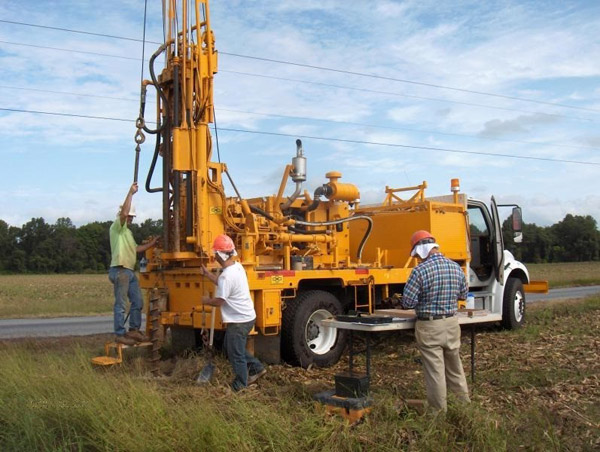Geotechnical Studies and Construction Materials Laboratory
The Geotechnical Studies Department and the Construction Materials Laboratory are one of the departments of Yasser Al-Aqabi Professional Consulting Company. It has obtained many accreditations, the most important of which is the accreditation of the Saudi Standards, Metrology and Quality Organization. The laboratory also applies the ISO17025 international quality system and has a highly qualified technical and administrative staff. The department is committed to providing its services in a manner that achieves the company’s aspirations and main objectives of quality work and maintaining our mission. The department aims to provide services of a high level of quality and with the required international specifications, implement work with impartiality and credibility, and create a successful and sustainable relationship with our clients by providing everything that is distinctive and exceeds the level of expectations in order to achieve our goal of providing services that gain their trust and satisfaction.

(Quality Policy) Quality Policy
- Our responsibilities are to ensure, through applicable standards and measures, that the level of quality in the laboratory of Yasser Al-Aqabi Engineering Consulting Office exceeds our customers’ satisfaction and expectations. This is achieved through:
- Establishing good professional practices and providing high-quality services to our customers.
- Ensuring that all employees involved in laboratory activities are familiar with quality documents and committed to implementing policies and procedures.
- Creating a distinct work culture and environment that encourages our employees to develop and improve their professional skills, set multiple standards and continuously improve the effectiveness of the ISO17025 system.
- Adhering to the requirements of the international standard specifications ISO 17025: 2017 Management and setting standards for continuous improvement and development that ensures the effectiveness of the management system.
- Encouraging and welcoming customer feedback and using it to proactively improve our performance and the quality of our services.
- Always following all policies and procedures of AV;M Yasser Al-Aqabi Professional Consulting to ensure compliance with the values and ideals of excellence, integrity, accountability, citizenship, and safety.
The work of the department is divided into two main branches:

First: The field of geotechnical studies and soil testing:
Geotechnical engineering is considered one of the most important fields of work and specialization in Yasser Al-Aqabi Professional Consulting Company. The company includes complete equipment and supplies to conduct all field investigations and laboratory geotechnical tests, including drilling rigs for taking samples at different depths and determining the groundwater level. The Geotechnical Engineering Department owns a number of drilling rigs mounted on trucks and can dig wells and take samples throughout the Kingdom, prepare the integrated technical report and provide technical solutions and recommendations. A number of technical crews work on these drilling rigs, represented by professional drillers, drilling assistants and trained workers. The field work teams are supervised by a number of specialized geologists and experienced geotechnical engineers. The department includes a number of drilling rigs specially prepared for taking samples from different types of soil.
Objectives of the geotechnical study:
The study aims to determine the bearing capacity of the soil, expected settlements, soil properties, type of suitable foundations, appropriate foundation depth, properties of soil layers and appropriate foundation depth, determine the groundwater level and a description of the general surface soil of the site as well as a description of the soil layers at all depths of the probes, results of field and laboratory experiments and tests, the quality and properties of the backfill soil, the quality of the concrete used in the foundations, technical recommendations and necessary engineering proposals to ensure the protection of the soil for the proposed buildings. The geotechnical study aims to include the geotechnical report with the necessary engineering recommendations and also includes the locations of the probes and a description of the project site in addition to a description of the soil or rock layers and the conditions of the soil or rock formations and the water table level and the results of field investigations and laboratory tests.
Second: Materials Laboratory (earthworks, concrete and asphalt):
The technical staff in the laboratory conducts laboratory and field tests according to standard specifications and under the supervision of engineers specialized in the field of materials engineering and prepares the necessary reports for each test including the specifications on which the tests were conducted. The laboratory is divided into three sections:
- Soil works testing laboratory.
- Concrete works quality control laboratory.
- Asphalt works quality control laboratory.
- A detailed overview of the tests and works performed by the laboratory and the standard specifications.
1. Soil Laboratory:
Soil Tests:
- Sieve Analysis According to AASHTO T-88
- Liquid Limit and Plasticity Coefficient According to AASHTO T-89
- Soil Classification According to AASHTO
- Organic Impurities According to AASHTO-21
- Modified Proctor Test According to AASHTO T-180
- California Bearing Ratio Test According to AASHTO T-193
- Field Dry Density Test According to AASHTO T-191
Aggregate Base Layer Tests:
Sieve Analysis According to AASHTO T-88 Liquid Limit and Plasticity Coefficient According to AASHTO T-89 200 Sieve Passage Percentage According to AASHTO T-11 Clay Lumbs According to ASTM-142-78 Organic Impurities According to AASHTO-21
2. Asphalt Laboratory:
Tests of binder layer, slabs and asphalt mixtures:
- Extraction test according to ASTM D-21.
- Sieve analysis test according to ASTM D-5444
- GMB measurement test according to ASTM D-1188
- Stability measurement according to ASTM D-6227
- VMA measurement.
- Air voids measurement.
- Hardness measurement.
- Crumble ratio according to AASHTO T-85.
- Los Angeles according to AASHTO T-96
- Sand equivalent according to AASHTO T-176
- Natural, flattened and flattened ratio according to AASHTOO
- Flow measurement.
- GMM test according to AASHTO T-209
Asphalt mix design by Marshall method.
Bitumen Tests:
- Measurement of spray temperature of adhesive and impregnation layers.
- Solubilization test in organic solvent according to ASTM D-2042.
3. Concrete Laboratory:
Aggregate suitability tests:
- Graphic gradation test for large aggregates. ASTM C-20
- Graphic gradation test for small aggregates. ASTM C-27
- Ratio of passing through sieve No. 200 for small aggregates ASTM C-117
- Ratio of passing through sieve No. 200 for large aggregates. AASHTOO T-11
- Test to determine the apparent weight of aggregates
- Test to determine the volumetric weight of aggregates and percentage of voids.
- .Soundness according to ASTM C -88
- Test to determine the crunchiness factor for large aggregates.
- Test to determine the percentage of clay and fine materials.
- Test to determine the percentage of absorption of aggregates
- Breath test according to AASHTOO T-96.
- Test for flattening, elongation and crumple factor.
- Fresh concrete tests:
- Slump test according to ASTM C-143.
- Concrete temperature test.
- Making cubes and cylinders according to standard specifications.
- c) Hardened concrete tests:
- Test to determine the compressive strength of standard cubes and cylinders according to BS3892-3
- Estimated compressive strength test using rebound hammer according to ASTM C-80
- Estimated compressive strength test using concrete core samples. According to ASTM C-42-90
- Test to determine the homogeneity of concrete and some of its engineering properties using an ultrasonic device on structural sections. According to ASTM C-597
4. Soil Mechanics Laboratory:
Compacting Tests:
- Proctor Test.
- Field Density Test Using Sand Cone.
Substitution Layers Suitability Tests:
- Characterization and Physical Properties Test.
- Grain Gradation Test for Soil.
- Clay and Fine Materials Percentage Test
- Atterberg Limit Test.
- Free Swelling Ratio Test.
- Size Weight Determination Test.
- Modified Proctor Test.
- Chemical Analysis Tests (PH-CL-SO3)

